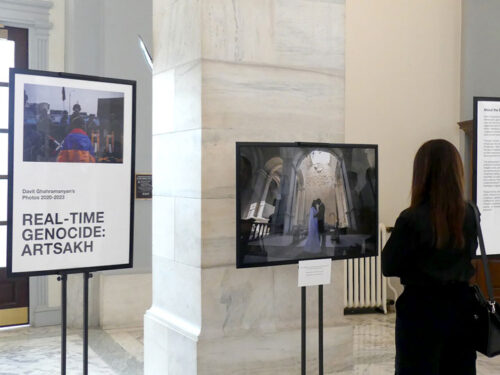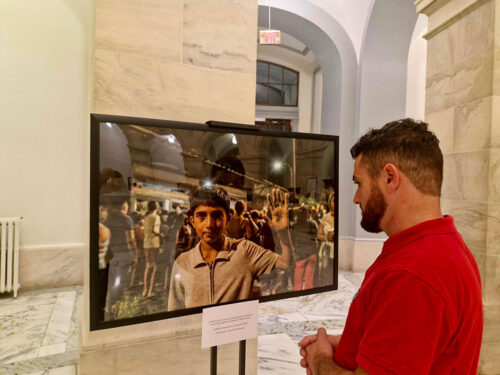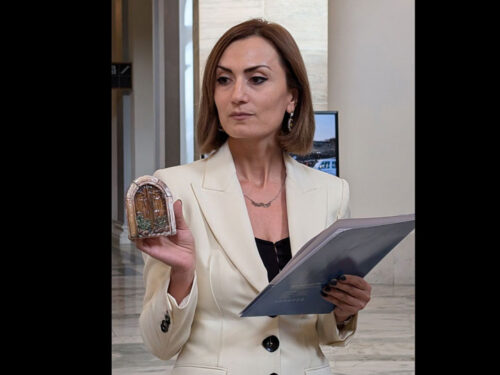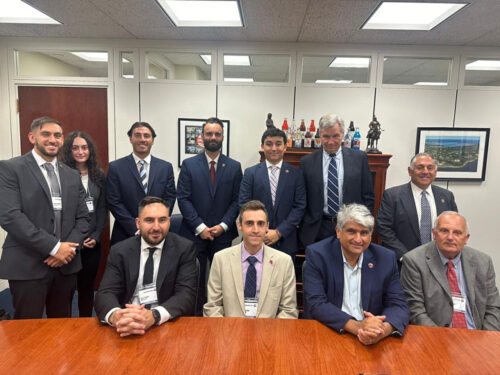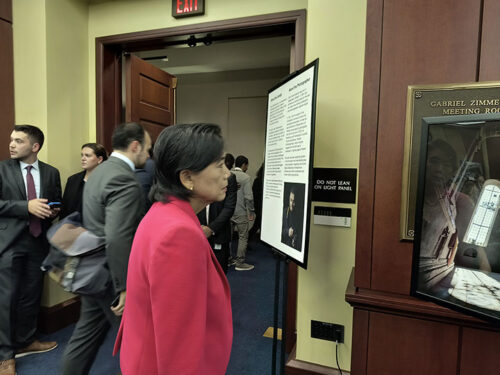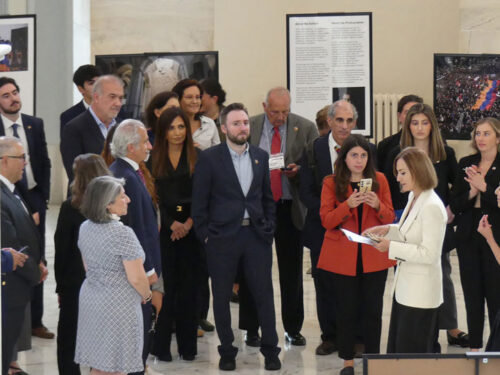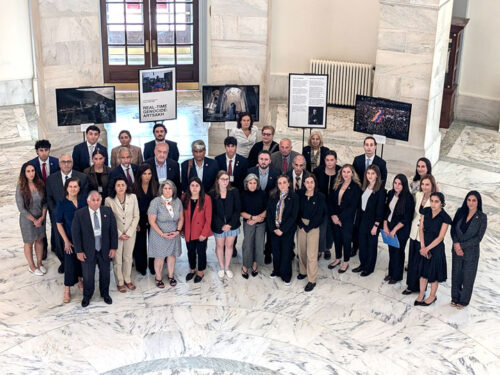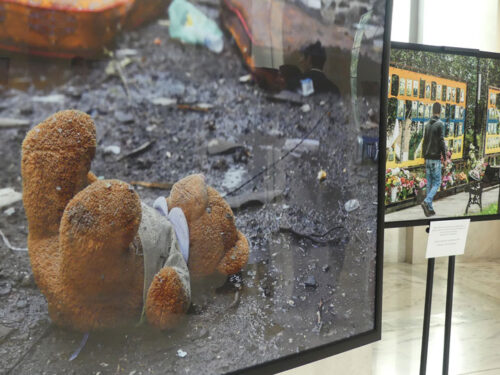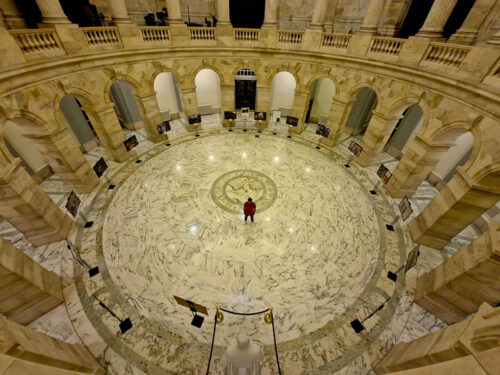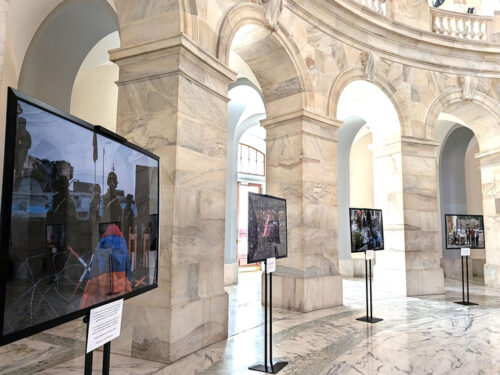Real-Time Genocide: Artsakh – Davit Ghahramanyan’s Photo Exhibited in the Historic Russell Senate Office Building
Exhibit Chronicles Azerbaijani Aggression against Artsakh’s Indigenous Armenians and the Need for Accountability
September 29, 2024Washington, DC – The powerful photo exhibit “Real-Time Genocide: Artsakh,” featuring the works of photojournalist Davit Ghahramanyan, ran from September 19 – 27th, 2024 at the Russell Senate Office Building Rotunda, reported the Armenian National Committee of America (ANCA). The exhibit, made possible through the efforts of Senator Sheldon Whitehouse (D-RI), captured the horrors of Azerbaijan and Turkey’s attacks in 2020 against Artsakh and its devastating aftermath, including the brutal 10-month blockade leading to the genocidal ethnic cleansing of 120,000 indigenous Armenian Christians in 2023.
“ANCA’s important exhibit in the Capitol rightfully brought attention to Azerbaijan’s brutal military attacks and blockade against Armenians in Nagorno-Karabakh,” stated Sen. Whitehouse. “I’m working diligently in Congress to ensure the authoritarian regime in Azerbaijan is held accountable for the clear human rights violations it has committed.”
ANCA Eastern Region Board Member Sosy Bouroujian expressed deep gratitude for Senator Whitehouse’s leadership, stating, “We are immensely thankful to Senator Whitehouse for sharing the story of Artsakh Armenians on Capitol Hill. This exhibit has been a critical step in bringing the truth about Azerbaijan’s genocidal ethnic cleansing directly to Congress and strengthening our efforts to hold Baku accountable for these horrific crimes.”
The September 19th opening ceremony of the photo exhibit featured poignant remarks from Hermine Avagyan, Executive Director of the Hamazkayin Armenian Educational and Cultural Association of Artsakh, who collaborated with Ghahramanyan on the photobook “Artsakh: The Unfinished War.” Avagyan emphasized the necessity of sharing the reality of Azerbaijan’s crimes: “The atrocities committed by Azerbaijan are evidenced by these photographs. They show how Azerbaijan targeted civilians, blockaded Artsakh, and forced its people into exile. This is not just a war; this is genocide.”
A particularly touching moment in Avagyan’s speech centered on a small clay gate made by children forcibly displaced from Artsakh. “This is not just an ordinary gate. A little girl from Shushi made this to represent the gate of her home. She asked me to show it to you and tell you that she believes this is the gate of justice and that it must open,” Avagyan shared. She further explained, “Justice will come because we will continue to pursue it relentlessly. We hope the U.S. Congress will not shy away from naming these events for what they are—genocide—and that justice will be restored, allowing the displaced people to return to their homeland and live in safety without threats to their lives.”
Ghahramanyan, who has been on the front lines documenting these atrocities since 2020, issued a powerful statement regarding the Capitol Hill debut of his photographs. “Every time I took a picture, I felt the pain, fear, and despair of our people, but also their unwavering will to hold onto their land and survive,” he shared. “These images are not just memories; they are calls for action—for justice.”
The exhibit was organized by the ANCA in collaboration with the Hamazkayin Armenian Educational and Cultural Association. It coincided with ANCA Eastern and Western Region Advocacy Days, which brought over 75 chapter leaders and activists from across the U.S. to the nation’s capital. The delegation met with legislators to advocate for measures aimed at holding Azerbaijan accountable, supporting Artsakh refugees, and ensuring the safe return of Armenians to their homeland. Photos from the exhibit were featured in the ANCA’s “Accountability | 2024” Capitol Hill commemorative program, which marked a full year of impunity for Azerbaijan’s September 19-20, 2023, military offensive and ethnic cleansing of Artsakh. Concurrent with the Capitol Hill exhibit, Avagyan and Ghahramanyan offered photo presentations in communities across the Eastern U.S., including Philadelphia, Chicago, Boston, and New York City.
The exhibit, “Real-Time Genocide: Artsakh,” is a haunting visual journey through the escalation of Azerbaijan’s genocidal attacks on Artsakh, documenting the impact of Azerbaijani military assaults, blockade, and forced displacement. The collection of images, taken between 2020 and 2023, serves as an urgent call to action, highlighting the human toll of Azerbaijan’s aggression while challenging the global narrative of indifference.
“The world is ablaze with wars and genocide,” said Ghahramanyan, upon the opening of the exhibit. “But that does not mean we should remain silent. What happened in Artsakh was a premeditated genocide. It is our responsibility, as an international community, to call things by their proper names and take meaningful steps to hold the Aliyev regime accountable.”
At the heart of the exhibit are photographs of civilians whose lives were torn apart by Azerbaijan’s attacks. One particularly devastating image shows a mother weeping beside the coffin of her 21-year-old son, a waterworks employee who was shot by Azerbaijani special forces. “These images are evidence that impunity breeds new and more brutal crimes,” Ghahramanyan stated.
Davit Ghahramanyan was born in Stepanakert, Artsakh, in 1991, and has worked as a photojournalist for the past four years, as a 301 media correspondent and freelancer, documenting Azerbaijan’s genocidal aggression against Artsakh. In 2021, with the support of the Hamazkayin Armenian Cultural and Educational Association, he held two solo exhibitions in Stepanakert and Yerevan, showcasing his photographs from the 44-day war. His work has been published globally – in the Armenian and international press – and included in reports by the Human Rights Defenders of Artsakh and Armenia and other humanitarian and human rights organizations.
The opening of the photo exhibit came at a critical moment as the ANCA continues to push for sanctions on Azerbaijan and advocate for the safe return of Armenians to Artsakh under international protection. Ghahramanyan’s exhibit vividly underscores the ongoing genocidal policies of Azerbaijan, reinforcing the urgency of the ANCA’s advocacy efforts.
For more information about the exhibit and ANCA’s advocacy efforts, please email anca@anca.org.
#####
